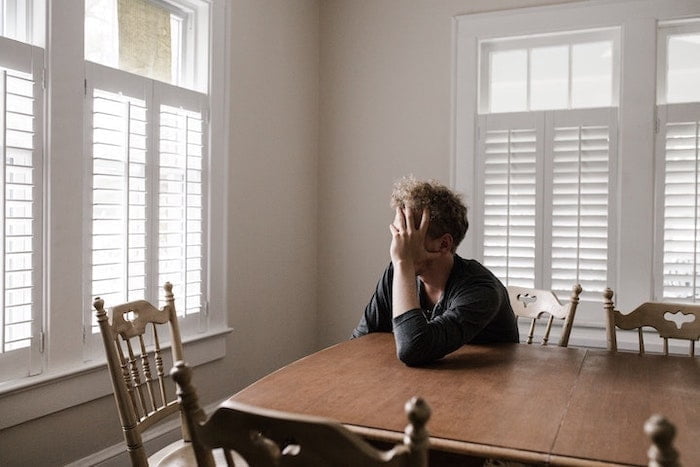Quick links for Dual Diagnosis Treatment
- What can cause a dual diagnosis?
- Do I have a dual diagnosis?
- Can I self-medicate to treat the symptoms of dual diagnosis?
- What are the most common co-occurring disorders during dual diagnosis?
- Symptoms of common co-occurring disorders during dual diagnosis
- How is a dual diagnosis treated?
- References for dual diagnosis
When an individual is diagnosed with a substance or behavioural addiction as well as an additional mental health disorder, this is known as a dual diagnosis or a co-occurring disorder.
Living with and recovering from substance addiction or a mental health disorder in itself can be extremely challenging.
When combined, a dual diagnosis presents a number of obstacles including an increased risk of suicide and greater difficulty in designing an effective treatment plan.
However, it is possible to live a content and fulfilling life despite suffering from a co-occurring disorder.
What can cause a dual diagnosis?

Young person in therapy for dual diagnosis
Dual diagnosis is fairly common among individuals with substance and behavioural addictions as well as mental health disorders.
One study on dual diagnosis found [1] that 44% of people dealing with alcohol addiction were also diagnosed with a mental health condition along with 64.4% of people with drug addiction.
There are certain factors that can increase the chances of dual diagnosis, with the most common listed below.
1. Genetic predisposition in dual diagnosis
Studies have shown that certain individuals are genetically predisposed towards mental health disorders, and these same people may also be more likely to develop a substance or behavioural addiction. [2]
This overlap could go some way towards explaining the frequency of co-occurring disorders and potentially help to predict the likelihood of future addiction within young people dealing with a mental health condition.
2. Early exposure in dual diagnosis
As a young person’s brain is still forming, being exposed to drugs or alcohol at an early age can result in an addiction or a mental health disorder developing in later life due to the higher likelihood of brain damage resulting from these substances.

Man holding his head whilst sat in therapy for dual diagnosis
3. Environmental triggers in dual diagnosis
Specific instances such as a traumatic event or a period of high stress can trigger the emergence of an addiction or mental health disorder (such as PTSD) in an otherwise healthy individual.
It is difficult, if not impossible to predict how each person will react to certain environmental triggers.
4. Substance reactions in dual diagnosis
Many illicit substances can cause symptoms that mimic those of a mental health disorder, and over time can develop into a more serious condition.
One example of this is heavy cannabis use resulting in symptoms of psychosis, which if left untreated has the potential to trigger schizophrenia.
Do I have a dual diagnosis?

Medical professional taking notes whilst speaking to a patient suffering from dual diagnosis
Our feelings and behaviours can quickly become normalised to us, and as a result, we may not realise that they have become detrimental to our health and wellbeing.
You may be aware that you have a substance addiction but may not realise that you are also dealing with a co-occurring mental health disorder.
Understanding how dual diagnosis works can give you a greater insight into your mindset and behaviours, allowing you to seek out and receive treatment for both your co-occurring disorder and your addiction.
If you can relate to some of the statements below, you may be struggling with substance addiction as well as a mental health disorder.
- I have a family history of substance abuse and/or mental health disorders
- I often use alcohol or drugs to get myself through times of stress, difficulty, or to escape from unpleasant emotions and memories
- I struggle with my mental health even during times that I am not using drugs or alcohol
- My substance use and mental health often go hand in hand – I drink when I feel depressed, or use drugs to help me relax when I’m feeling anxious
- I have previously been treated for substance addiction or mental health disorder in the past and struggled to complete the treatment
- I use drugs or alcohol as a way to feel better about my life and my emotions
- I can pinpoint one or more experiences in my past that have to lead to trauma

Patient speaking with a therapist about dual diagnosis treatment at a drug and alcohol rehab
If you suspect that you have a dual diagnosis, seek medical advice and guidance.
It is not recommended to self-diagnose, particularly in relation to addiction and mental health.
An experienced doctor will perform an assessment in order to provide you with a correct diagnosis and treatment plan that will increase the likelihood of long-term recovery.
Can I self-medicate to treat the symptoms of dual diagnosis?

Therapist taking notes whilst talking to a patient about dual diagnosis
Often, people dealing with a mental health disorder will self-medicate with drugs and alcohol as a way to numb their emotions and escape from unpleasant memories or sensations.
However, attempting to mask a condition such as anxiety or bipolar disorder with these substances can have severely detrimental effects.
The body will likely build up a tolerance, requiring a higher dosage and more frequent ingestions in order to achieve the desired effect.
This can lead to dependency and addiction and has the potential to make the original mental health disorder more severe.
What are the most common co-occurring disorders during dual diagnosis?

Doctor taking notes about dual diagnosis
Addiction does not often develop without an underlying reason.
Many people dealing with substance or behavioural addiction are also dealing with a mental health disorder, so it is important to treat both issues concurrently.
Below are some of the most common mental health disorders that can be linked with addiction:
1. Depression
A common mood disorder that can cause individuals to feel sad, hopeless and worthless on a regular basis, depression is more than just the regular ups and downs of life.
It can last for weeks or even months, and sufferers of this disorder find it difficult to enjoy life or even get out of bed in the morning.
Depression can be constant or infrequent and often leads to thoughts of suicide.
2. Generalised anxiety disorder (GAD)
Most people feel anxious at times, but an anxiety disorder involves frequent bouts of worrying and anxiety over situations that do not call for an extreme response.
The individual may feel as though something bad is about to happen to them and will overthink situations in an attempt to discover a perceived threat.
Generalised anxiety disorder can put a strain on relationships and prevent sufferers from functioning in their daily lives.
3. Bipolar disorder
If you deal with constant and intense emotional mood swings, feeling hyperactive and overconfident one day but depressed and worthless the next, you may be suffering from bipolar disorder.
This mood disorder usually manifests in episodes of mania and depression, with some individuals experiencing psychotic symptoms.
People with bipolar disorder can find it very difficult to cope with these intense mood swings.

People holding hands and discussing dual diagnosis
4. Post-traumatic stress disorder (PTSD)
Experiencing or witnessing a traumatic event, such as sexual assault or a terrorist attack, can result in post-traumatic stress disorder as the individual struggles to come to terms with what happened to them.
This can involve nightmares, intense flashbacks and feelings of depression and hopelessness.
5. Schizophrenia
Schizophrenia and conditions like schizoaffective disorder can cause an individual to think and behave in a way that seems like they have lost touch with reality.
They may hear voices, see things that aren’t there and have trouble determining what is real and what isn’t.
Schizophrenia is a serious mental health disorder that requires professional treatment and can be extremely detrimental to an individual’s life, health and general well-being. [3]
6. Borderline personality disorder (BPD)
Often manifesting in feelings of uncontrollable anger, frequent and intense mood swings and trouble forming relationships, a borderline personality disorder can lead to impulsive and self-destructive behaviour.
Individuals with this disorder may struggle with their self-image and find themselves in a pattern of unstable relationships, reinforcing feelings of isolation and low self-esteem. [4]
Symptoms of common co-occurring disorders during dual diagnosis

Therapist and patient speaking together about dual diagnosis
There are certain mental health disorders that are more likely to occur alongside substance and behavioural addictions in a dual diagnosis.
Some people will develop an addiction after being diagnosed with a mental health disorder, while others may experience the opposite effect.
Common co-occurring disorders include:
Symptoms of depression
- Feeling hopeless, sad or empty
- Frequent bouts of crying
- Little interest in activities that were once enjoyed
- Fatigue and lethargy
- Changes in weight
- Frequent suicidal thoughts or suicide attempts
- Trouble falling or staying asleep, or sleeping too much
Symptoms of generalised anxiety disorder (GAD)
- Frequent thoughts and feelings of anxiety
- Finding it difficult to relax and switch off
- Overthinking
- Fear of making the wrong decision
- Heart palpitations
- Excessive perspiration
- Feeling afraid and threatened in benign situations
Symptoms of bipolar disorder
- Mania – impulsive behaviour, excitement, high self-confidence
- Depression – feeling sad and hopeless, thoughts of suicide, fatigue
- Intense and frequent mood swings
- Psychosis

Man holding his head due to dual diagnosis symptoms
Symptoms of post-traumatic stress disorder (PTSD)
- Vivid memories of the traumatic event
- Flashbacks
- Avoiding situations and thoughts that may trigger unwanted memories
- Being on high alert, having trouble relaxing
- Extreme physical responses to triggers
- Difficulty remembering details of the traumatic event
- Self-destructive behaviours
- Feelings of guilt and shame
Symptoms of schizophrenia
- Visual, auditory or tactile hallucinations
- Delusions
- Agitation and/or aggressiveness
- Poor grooming and personal hygiene
- Inability to form cohesive sentences
- Behaving inappropriately
Symptoms of borderline personality disorder (BPD)
- Fear of abandonment
- Intense mood swings
- Self-destructive behaviours
- Trouble forming and keeping relationships
- Uncontrollable feelings of anger
- Difficultly forming a clear self-image
Symptoms of substance abuse and addiction
A substance addiction will usually manifest in a range of physical and psychological symptoms, while a behavioural addiction may be more easily concealed.
Some of the most common warning signs of addiction include:
- A desire to reduce or completely stop using the substance or engaging in the behaviour, but being unable to
- Experiencing negative consequences directly related to the substance or behaviour
- Loss of interest in hobbies, relationships and other activities
- Neglecting responsibilities at work, school or home
- Being secretive, dishonest and defensive about the extent of the substance use or behaviours
- Poor hygiene
- Spending large amounts of money on addictive substances or behaviours
- Low self-esteem
How is a dual diagnosis treated?

Woman talking on a phone after dual diagnosis treatment
As one condition can aggravate the other, both must be effectively treated in order for the patient to successfully recover.
A professional diagnosis must first be established in order to provide the most accurate treatment.
This is conducted by an experienced doctor who is trained in identifying each specific condition. It is not recommended to self-diagnose in this instance.
Once a diagnosis has been performed, a treatment plan will be designed.
It is recommended that anyone dealing with a dual diagnosis should attend a treatment programme at a specialised local rehabilitation centre where they will receive the required physical and psychological care as well as long-term aftercare.
The separate disorders are treated either sequentially or simultaneously, depending on the method of treatment. Each condition must be managed in a coordinated method, considering the co-occurring disorders. [5]
This can often be difficult as many treatment centres are only able to provide care for individual addictions and mental health disorders.
To make sure you end up at the right drug and alcohol rehab to treat both your addiction and your mental health condition, call our experts on 0800 326 5559
References for dual diagnosis
- https://www.ncbi.nlm.nih.gov/pmc/articles/PMC6876494/
- https://www.sciencedaily.com/releases/2016/10/161006103242.htm
- https://www.nimh.nih.gov/health/topics/schizophrenia/index.shtml
- https://www.nimh.nih.gov/health/publications/borderline-personality-disorder/index.shtml
- https://www.sciencedaily.com/releases/2016/10/161006103242.htm






